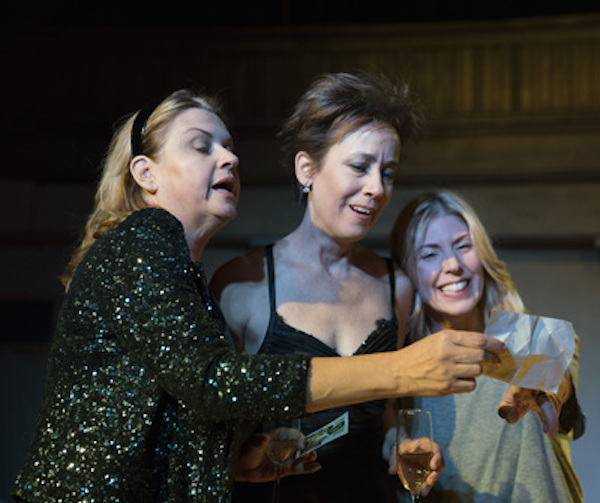Theater Review: “Di and Viv and Rose” — Female Bonding, Done Right
Di, Viv, and Rose make for an irresistible trio in Amelia Bulmore’s moving play.
Di and Viv and Rose by Amelia Bulmore. Directed by Kate Kataja. Staged by the Wilbury Theatre Group at the Trinity Square Theatre, 393 Broad Street, Providence, Rhode Island, through December 30.

Rae Mancini, Milly Masey, and Melissa Penick in “Di and Viv and Rose” at The Wilbury Theatre Group. Photo: James Lastowski.
By Mary Paula Hunter
The Wilbury Theatre has a winner in Di and Viv and Rose, a play that is kind of a mess but happily so. Like its counterpart Straight White Men (currently running in repertory), the script has precious little room in its heart for the opposite sex. But its deeply drawn characters make for a spellbinding evening; issues of gender, while important to the story of Di, Viv, and Rose, are not hammered as hard as they are in SWM. What we get in Di and Viv and Rose is a portrait of complex characters; the men featured in SWM are too often cartoon renderings of the rambunctious and (of course) insensitive male. Without wallowing in the dreaded dramaturgical flaw of “too much information,” these women comment on the trials and tribulations of life in honest terms and as a result we root and pray for them.
We look in at the title trio during the ’80s, when they come together as a unit in college, living cheek to jowl in an apartment that Rose’s family owns. Backgrounds are hinted at, but questions still abound: Is Rose wealthy? Was Viv abused? We’re never sure and, in less sure hands, the narrative’s scattershot narrative (by English actress and writer Amelia Bulmore), could have quickly become annoying. But the Wilbury Theatre Group’s superb trio of performers — Rae Mancini (Di), Milly Massey, (Vic), and Melissa Penick (Rose) — keep us emotionally engaged throughout.
The militaristic Viv sports army jackets and boots. She’s gender neutral and writes often about the restrictive nature of female clothes — the corset is an obsession. Her opposite, Rose, celebrates the female body in form fitting jeans and tops, foreshadowing the evolving (or is that confusing?) face of feminism. Di serves as the perfect go between, a lesbian who sees both sides of every issue and persuades Viv to give the lascivious and big-hearted Rose a break. “I like her,” she insists, and the writing is perceptive enough to draw us into the inevitable bonding process: the three are slowly woven together into an unbreakable web.
They experience more than their share of tragedy and success, highs and lows that are at times hard to make sense of. Viv becomes a rich literary star — by writing books about the history of the glove? Implausible yes, but these actresses take you into their characters’ hearts and minds until you don’t care all that much that what happens to them is not feasible. Instead, you become wrapped up in their inner lives and transformations. The rape scene at the end of the Act I is heart wrenching; the friends’ determination to assist in the healing process is inspirational. Loyalty and friendship serve as potent remedies for tragedy; the death of one tests the strength of the triangle, ultimately giving lie to the maxim that two’s company and three’s a crowd. The survivors devolve into a bickering and unforgiving twosome.
Kate Kataja’s direction is now and then clumsy (there are a lot of exits where we have no idea where the characters are going), but she beautifully juggles the script’s disparate examinations of feminism, sexuality, and ambition. A lot of the rapid-fire exchange of opinions could easily be lost, but Kataja makes sure the dialogue lingers while the performers artfully negotiate the cramped playing area. On occasion, the play becomes dance-like; a go-for-broke dance-athon (to some great ’80s tunes) pops up naturally, a predictable expression of the women’s feelings for each other. It is hard not to want to join in and experience the love. By the time Di and Viv and Rose‘s final powerful image arrives — the three holding hands, their backs to the audience — it is difficult to not yearn for a sequel, or at least a third act. Di, Viv, and Rose are an irresistible trio.
Mary Paula Hunter lives in Providence, RI. She’s the 2014 Pell Award Winner for service to the Arts in RI. She is a choreographer and a writer who creates and performs her own text-based movement pieces.
Tagged: Amelia Bulmore, Di and Viv and Rose, Kate Kataja, Melissa Penick, Milly Masey, Rae Mancini
